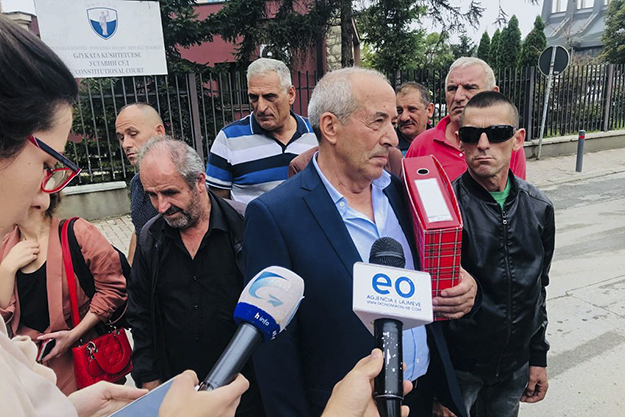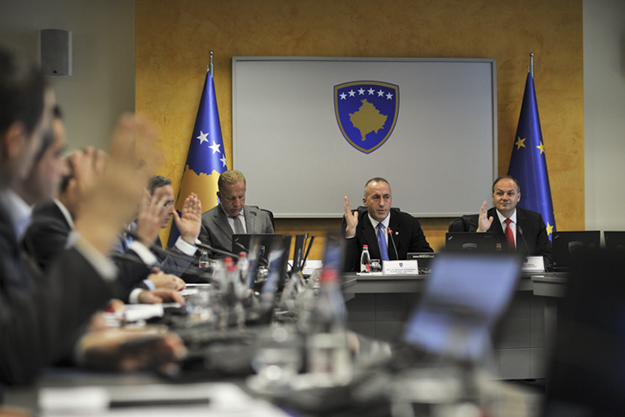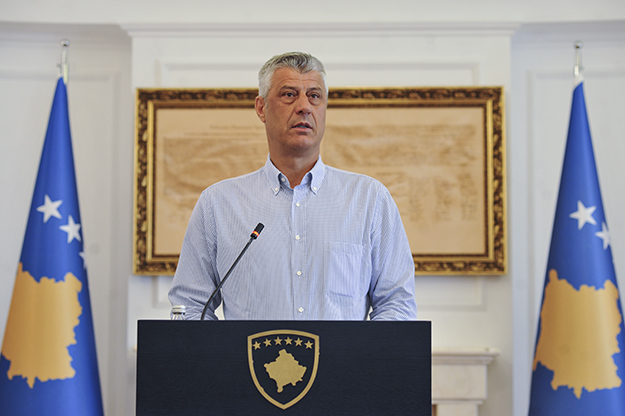Established in 2009 — around a year after Kosovo declared independence — the Constitutional Court is comprised of nine judges and is the ultimate authority for interpreting and verifying the compliance of laws that are approved by the Assembly with the Constitution. It is one of the main pillars of judicial regulation in the country.
Since its establishment, the Constitutional Court has dealt with many difficult legal cases and has taken some tricky decisions, including on two former presidents, Fatmir Sejdiu and Behgjet Pacolli, who were forced to resign after the Court found that they had violated the Constitution either during the election process or during their mandate.
In general, 2018 has not been an easy year for the Court. In May, the process of appointing new members of the Court was accompanied by huge controversy, as two of the nominated judges were strongly contested by the opposition and judicial experts.
The nomination and election of Serb judge Radomir Laban, who was decreed by the president as a constitutional judge in August, was followed by huge criticism after the media reported that Laban had been sentenced by a court in Serbia in 2012 for misusing an official position to commit criminal acts, for which he is reportedly being sought by Interpol after fleeing Serbia to Kosovo to avoid completing his sentence.
The process against him in Serbia lasted five years and was based on accusations of evading taxes and excises for the benefit of a criminal group. For the next nine years he is mandated to be part of the roster of judges in the Constitutional Court of Kosovo.
Another judge who was nominated and ultimately appointed despite resistance from the opposition is Safet Hoxha. Civil society organizations have said that he is closely associated with the Democratic Party of Kosovo (PDK) and that this violates the integrity of the highest court in Kosovo’s judicial system.
In addition to issues regarding the appointment of judges, the Constitutional Court also had a lot of work on challenging cases that have been reviewed this year. An association sought recognition of its right to sue a state for damages caused during the war, a citizen sought recognition of his right to officially change his name and sex marker in his identification documents, while the president and the prime minister were also dragged into cases.
In this article, K2.0 analyzes four specific cases that were sent to this judicial instance for review. These cases comprise significant challenges for Kosovo’s young judicial system, and decisions regarding these cases could set judicial precedents with widespread implications for different areas of society.
Suing another state

The association Ngritja e Zërit (Raising the Voice) has sent many complaints to the Constitutional Court after hundreds of complaints were rejected by other lower level courts. Photo courtesy of Ngritja e Zërit.
One of the biggest challenges for constitutional judges is the case filed by the Ngritja e Zërit (Raising the Voice) association from the town of Skenderaj. The association complained to the court regarding decisions made by judges at lower level courts, including basic courts from different cities in Kosovo, the Appeals’ Court, and the Supreme Court.
Since 2008, Ngritja e Zërit has compiled more than 800 requests for indictments against the state of Serbia for human and material damages caused during the war in Kosovo. These requests were filed at multiple basic level courts in different municipalities in Kosovo.
However, the basic courts have rejected them as having no basis, with the justification that Kosovo courts have no jurisdiction to exercise indictments against another state, and that this could be done only in courts that belong to the accused state, in this case Serbia. Of 850 indictments that have been rejected by the basic courts for having no basis, 450 were sent for review at the Appeals’ Court, where they were all rejected, while dozens of these have also subsequently been rejected by the Supreme Court.
On October 11, 2018, members of the association filed a pile of rejected indictments to the Constitutional Court. The head of the association, Jahir Bejta, says that Kosovar courts have the competence to judge these crimes, since they were committed on Kosovar territory.
In conversation with K2.0, Bejta says that he believes that the decisions not to accept these cases have a political background, which according to him is absurd, because citizens should be able to sue Serbia and seek compensation for damages caused during the war.
The last hope is the Constitutional Court, from which his association has sought an interpretation of the constitutionality of the Supreme Court’s decisions not to hear their requests for compensation for damages from the Serbian state.
Similar complaints have been rejected by the Constitutional Court on two previous occasions, but in October, Bejta went back to the institution for the third time. He says that 60 requests for review have been denied by the Supreme Court of Kosovo. The Constitutional Court has already assessed 32 of these requests, describing them as unacceptable for review.
The legal basis on which the basic courts have denied their complaints is Article 18.3 of the Law on Contested Procedure, which states: “If the court during all stages of proceeding determines that the local court is not competent, it will be declared incompetent, all the proceeding will be nullified and the claim will be dropped.”
Florent Spahija, a legal adviser at the democratic accountability NGO Kosovo Democratic Institute (KDI), says that Kosovo’s courts do not have territorial or subjective jurisdiction in Serbia, and Kosovo would need to sue Serbia in international instances of justice and demand compensation.
But, Spahija also says that in this case there is a slight problem:
“During its occupation by Serbia, Kosovo did not have any international subjectivity as a country and, together with Serbia, was part of Yugoslavia. This is the part that makes the legal process in this case more complicated in the international area.”
Correcting papers

Blert Morina asked the Constitutional Court to give him the right to change his name and sex marker in his identity papers. Photo: Majlinda Hoxha / K2.0.
Blert Morina is the first transgender person to make a request to change his name and sex marker in his Kosovo identification documents, a request that was denied by the Office of Civil Registry in Gjakova. Morina was assigned the female biological sex at birth but identifies as male, which causes issues in places or institutions that require him to present identification documents.
Through this request he sought to change his name from ‘Blerta’ to ‘Blert,’ as well as his sex marker from Female (F) to Male (M). But a decision to deny his request was made after a Commission within the Ministry of Internal Affairs’ Agency of Civil Registry issued a negative recommendation opposing Blert’s request.
The request made by Blert’s legal representative is based on Article 6, Paragraph 1.8 of the Administrative Order on the Conditions and Procedures for Personal Name Change and Correction, which states that a person can change their name if their personal name “hinders person’s integration into society.” However, the Commission of the Agency of Civil Registry has stated that the application does not fulfil the criteria of the Administrative Order.
Morina’s legal representative, Rina Kika, told K2.0 in May that “the lack of a specific administrative order is no justification to refuse the request for changing his gender in identification documents,” because, she says, the same Administrative Order that is used to change names is sufficient to be used to change sex marker. She also bases her claims on International Conventions such as the Universal Declaration of Human Rights and the European Convention on Human Rights.
On July 30, the case was filed at the Constitutional Court. The Ombudsperson is supporting the request as an amicus curiae (friend of the court), saying that the institution backs Morina’s right to go directly to the Constitutional Court without first going through the lower courts. This is because the circumstances means that first going through the Basic Court of Prishtina — where cases can often be delayed for years — is not considered to be an effective and suitable remedy, given that it would likely unduly extend Morina’s problems, anxiety and suffering.
A positive decision by the Court for Morina would open the legal route for others to file similar requests in institutions.

Prime Minister Ramush Haradinaj made the decision to increase the salary for himself and for his cabinet, a decision that was approved by the Constitutional Court. Photo: Atdhe Mulla / K2.0.
The prime minister’s pay rise
In December 2017, Prime Minister Ramush Haradinaj made the decision to increase the salaries of government officials, including his own salary, as well as those of his deputy prime ministers and ministers. With this decision, Haradinaj increased his own salary from 1,443 to 2,950 euros per month, whereas the salaries of deputy prime ministers were increased from 1,356 to 2,500 euros per month.
The decision caused huge discontent and protests, but Haradinaj justified it by saying that it makes no sense for the head of the government to be paid 1,300 euros since he has great political responsibility.
The decision also faced resistance from one of the coalition partners that make up the government, the Democratic Party of Kosovo (PDK). Ministers from the party said that they would not accept the wage increase. Meanwhile, referring to a claim made by the prime minister that he has high monthly costs because he has to purchase, among other things, ties to appear professional, a group of citizens brought ties and hung them on the fence of the Government building.
The Kosovo Anti-Corruption Agency described the decision as illegal, but after a request for the Constitutional Court to review the case was filed by 30 Kosovo Assembly deputies, the Court declared that the decision did not go against the Constitution, and that the individuals who filed the request had not provided convincing evidence to support their claims that the decision had violated constitutional provisions.
However, critics have said that the decision to increase wages for many officials is also damaging to the integrity of the justice system, including the Constitutional Court. This is because the wage increase automatically included workers within the court system, since according to current legislation, the salaries of the executive branch and the judicial branch have to be balanced.
The government’s decision and its subsequent approval by the Constitutional Court increased the salaries of the most highly paid judges and prosecutors from 1,400 to almost 3,000 euros a month, whereas the monthly salaries of Constitutional Court judges may now rise to up to 4,000 euros, depending on additional benefits.
At the time the decision was made, the panel of judges was comprised of Arta Rama-Hajrizi, Ivan Cukalovic, Atlay Suroy, Snezhana Botusharova, Selvete Gerxhaliu, Gresa Caka-Nimani, Almiro Rodrigues and Bekim Sejdiu. Only Rodrigues and Caka-Nimani voted against the decision to increase wages. After changes to the Constitutional Court’s composition — which now includes all Kosovar judges for the first time — only four of the eight judges on the panel at the time have remained.
Rreze Hoxha, a legal expert from the Group of Legal and Political Studies (GLPS) says that in this case, the Constitutional Court has failed in its primary role to protect and interpret the Constitution and has legitimized the government’s policies, which are made by one office or one person, without considering accountability in relation to constitutional practice.

President Hashim Thaçi challenged the Constitutional Court with the request for clarification of Article 18 of the Constitution regulating the ratification of international agreements. Photo: Atdhe Mulla / K2.0.
The president’s signature
At a time when negotiations between Kosovo and Serbia and the possibility of reaching a final agreement on ‘normalizing’ relations are very much in discussion, Kosovo’s President’s Office sent an inquiry to the Constitutional Court, asking for an explanation and interpretation of Article 18 of the Constitution, specifically the elements related to the procedure for ratifying international agreements, outlined in Paragraphs 1 and 2.
Paragraph 1 says that a two-thirds majority of Assembly of Kosovo deputies are required to ratify all international agreements that involve the following issues: territory, peace, alliances, political and military issues. Paragraph 2 states that all other international agreements that are not included in the first point are ratified with the approval of the president.
The president’s inquiry was connected to an agreement between Kosovo and the EU over the EU Rule of Law Mission’s (EULEX) revised mandate, seeking clarification over whether this had to be approved by two‐thirds of the Assembly, or if it was possible to be done by the president through an exchange of letters, since the original mandate had already been previously approved by deputies.
His request included two points for which he is seeking explanation:
Point 1 – Does it need to be ratified as an international agreement with two‐thirds of the vote of all deputies of the Assembly of the Republic of Kosovo (in compliance with Article 18.1 of the Constitution) or
Point 2 – Should it be considered ratified after it has been signed by the president (in compliance with Article 18.2 of the Constitution) as the changes to EULEX’s role and executive mandate mean its powers will be reduced.
This request was viewed with suspicion by many people within civil society, as well as certain deputies who connected President Thaçi’s request with the negotiations he was assumed to be having with Serbia over exchanging territory, with the idea that the president is seeking to completely avoid the Assembly in his decision making regarding the ongoing dialogue process with Serbia.
On September 28, deputy Korab Sejdiu sent a letter to the Constitutional Court through which he opposed the president’s request for interpretation of Article 18 of the Constitution.
He specifically demanded that Article 113 of the Constitution not be neglected.
The second and third point of Article 113 (which refers to Jurisdiction and Authorised Parties) lists cases when the Assembly, the president, the government or the Ombudsperson can raise issues in the Constitutional Court, such as the compatibility of laws with the Constitution or the compatibility of constitutional amendments with international agreements. Based upon these points, Sejdiu argued that the case raised by the president does not constitute an object for review by the Constitutional Court.
“Considering that this is not about making a new agreement, but is rather about an exchange of letters, which is not related to international agreements ratified by the Assembly, the case raised by the individual who filed the request does not constitute an object for review,” Sejdiu’s letter states.
KDI’s Spahija however thinks that the president has the legitimate right to formally ask for clarifications from the Constitutional Court in any case he sees fit. In this particular case, he believes that the EULEX mandate should be approved by the Assembly like any other international agreement.
K2.0 sent questions to the Constitutional Court regarding all of the aforementioned cases, specifically regarding when the Court is expected to issue a decision or interpretation for these issues.
Veton Dula from the Information Office said that the requests are being reviewed by the panel of judges, and that there is no determined period for issuing a decision, but added that the court would do so within a reasonable time period.
Ultimately, the Constitutional Court faces difficult decisions in each case, which will help to write the history of Kosovo’s judicial system, and will be referred to in disputes over future similar cases.K
Feature image: Atdhe Mulla / K2.0.


